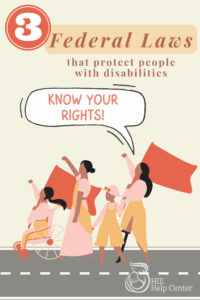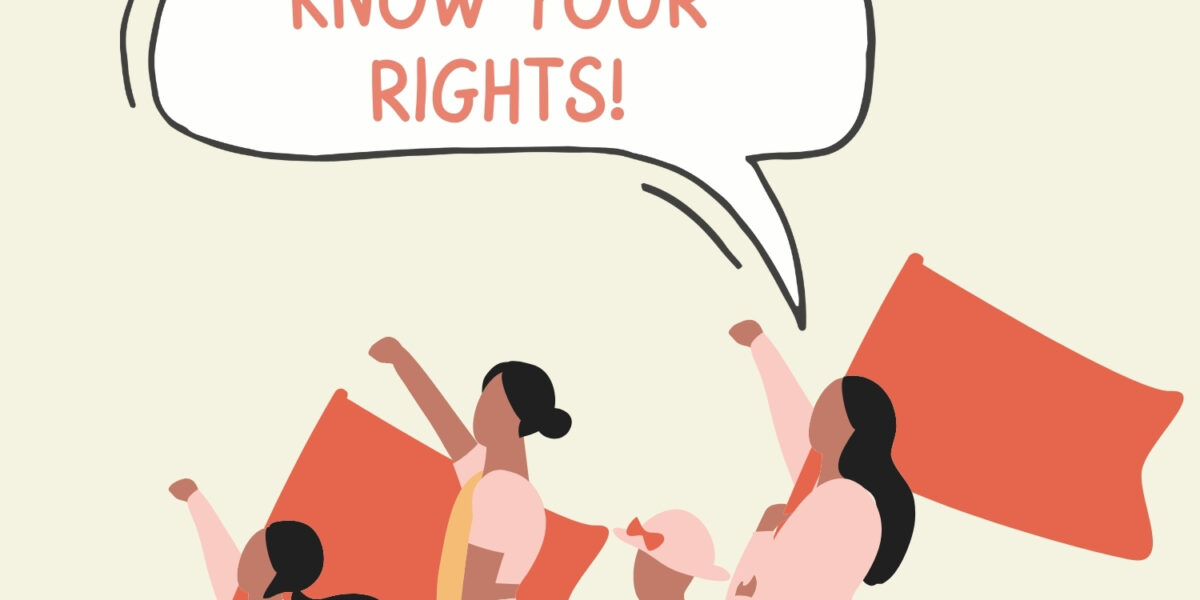 Parents of children with HIE often become invested in learning about disability rights laws in order to more easily advocate for their children. Here, we provide a brief overview of laws guaranteeing the rights of people with disabilities. Basic human rights are protected under the United States Constitution, but there are three especially important pieces of legislation that explicitly protect disabled people:
Parents of children with HIE often become invested in learning about disability rights laws in order to more easily advocate for their children. Here, we provide a brief overview of laws guaranteeing the rights of people with disabilities. Basic human rights are protected under the United States Constitution, but there are three especially important pieces of legislation that explicitly protect disabled people:
- The Rehabilitation Act
- Individuals with Disabilities Education Act (IDEA)
- Americans with Disabilities Act (ADA)
The Rehabilitation Act
Section 504 of The Rehabilitation Act passed in 1973. This act was the first piece of civil rights legislation to specifically address the rights of people with disabilities (1). The Rehabilitation Act made it illegal for programs that receive federal funding, such as universities, to discriminate on the basis of a disability.
Important things to know about the Rehabilitation Act (2):
- People with disabilities are defined as those who have a physical or mental impairment that limits a major life activity, such as walking, seeing, hearing, speaking, learning, or working.
- To qualify, a student must be able to provide a record of their disability (such as medical documentation)
- Students with disabilities have the right to an “free and appropriate” education
- Parents must be notified if their child is:
- Being evaluated for learning difficulties
- Identified as potentially having a disability or
- Placed in a special education program
- An impartial hearing should be provided when parents object to something about how their child has been evaluated, identified, or placed
- Students should be educated alongside their non-disabled peers whenever appropriate
The Individuals with Disabilities Education Act (IDEA)
Originally passed in 1975 under the name “Education for All Handicapped Children Act,” IDEA mandates that children with disabilities must receive a free and appropriate education (FAPE) in the least restrictive environment (LRE). It also provides financial assistance to help educational agencies comply with federal laws and provide required services to students with disabilities.
An amendment to change the name to the Individuals with Disabilities Education Act (IDEA) occurred in 1990. Additional amendments passed in 1997 and 2004 (3). IDEA describes the services that must be provided to students in elementary and secondary schools, and emphasizes the concept of Individual Education Programs (IEPs) for students with disabilities (1).
What does IDEA do? (2)
- IDEA protects children, which includes people up to age 21, who are eligible for special education and related services. Disabilities that make a child eligible for such services include autism spectrum disorder, cerebral palsy, vision or hearing impairments, and many more.
- Provides funding to help states and education agencies meet special education requirements.
- Parents must be given a written notice if their students are evaluated for learning difficulties, identified as having a disability, or placed in a special education program. This notice must be given prior to any evaluation or change in placement.
- An impartial hearing should be provided when parents object to something about how their child has been evaluated, identified, or placed.
- All children in special education programs should have an Individual Education Programs (IEP). This is a written document.
The Americans with Disabilities Act (ADA)
Signed into law in 1990, the Americans with Disabilities Act (ADA) act prohibits discrimination against people with disabilities in many different settings. This law includes 5 broad categories of protection for disabled people (4):
- Employment
- State and Local Government Activities
- Public Transportation
- Public Accommodations
- Telecommunications Relay Services
Important things to know about the ADA (2):
- “Reasonable accommodations” must be provided for qualified students or employees who have a disability. These accommodations may include providing written communication in alternative formats, redesigning equipment, modifying tests, etc.
- The ADA applies to nonsectarian private schools, but not to religious schools or organizations.
- Provides some tax credits so that institutions may work to increase their accessibility.
- Details procedures for filing complaints against institutions that fail to accommodate people with disabilities &
- Outlines the consequences for noncompliance with ADA regulations
About HIE Help Center
The HIE Help Center is run by ABC Law Centers (Reiter & Walsh, P.C.), a medical malpractice firm exclusively handling cases involving HIE and related birth injuries since the firm’s inception in 1997.
If you suspect your child’s HIE may have been caused by medical negligence, contact us to learn more about pursuing a case. We provide free legal consultations, during which we will inform you of your legal options and answer any questions you have. Moreover, you would pay nothing throughout the entire legal process unless we obtain a favorable settlement.
Sources
- What U.S. federal legislation protects the rights of students with disabilities? (n.d.). Retrieved from https://www.washington.edu/doit/what-us-federal-legislation-protects-rights-students-disabilities
- A Comparison of ADA, IDEA, and Section 504. (n.d.). Retrieved from https://dredf.org/legal-advocacy/laws/a-comparison-of-ada-idea-and-section-504/
- What is the Individuals with Disabilities Education Act? (n.d.). Retrieved from https://www.washington.edu/doit/what-individuals-disabilities-education-act
- A Guide to Disability Rights Laws. (n.d.). Retrieved from https://www.ada.gov/cguide.htm#anchor65610

